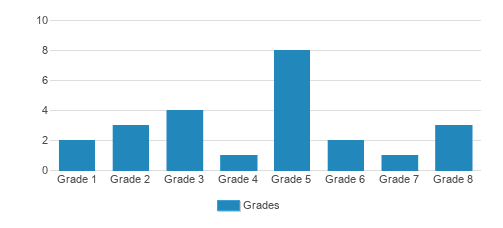Chestnut Hill School graduate programs in education are designed to meet the professional needs of teachers.
Since the role of the teacher is crucial in creating a healthy teaching/learning environment, the primary purpose of Chestnut Hill's graduate programs in education is to help prospective and current teachers enhance the quality of their teaching.
The graduate programs integrate knowledge and field experience, theory and practice.
The curricula offer both breadth of knowledge and in-depth specialization.
Teachers have the opportunity to acquire advanced knowledge, to develop greater competence in their disciplines, and to discover innovative and effective approaches to the educational process.
In sum, the overall objective of these programs is to contribute significantly to the improvement of instruction in the classroom and, ultimately, to the quality of education in the schools.
School Overview
School Type
Religious Affiliation
Grades Offered
Grades 1-8
Student Body
Total Students
24 students
Student Body Type
Co-ed
Students by Grade

Academics and Faculty
Total Classroom Teachers
1 teacher
Student : Teacher Ratio
24:1
National avg.: 13:1
Tuition and Acceptance Rate
Admission Deadline
None / Rolling
School Notes
- Chestnut Hill School graduate programs in education are designed to meet the professional needs of teachers. Since the role of the teacher is crucial in creating a healthy teaching/learning environment, the primary purpose of Chestnut Hill's graduate programs in education is to help prospective and current teachers enhance the quality of their teaching. The graduate programs integrate knowledge and field experience, theory and practice. The curricula offer both breadth of knowledge and in-depth specialization. Teachers have the opportunity to acquire advanced knowledge, to develop greater competence in their disciplines, and to discover innovative and effective approaches to the educational process. In sum, the overall objective of these programs is to contribute significantly to the improvement of instruction in the classroom and, ultimately, to the quality of education in the schools.
Source: National Center for Education Statistics (NCES)
Frequently Asked Questions
When is the application deadline for Chestnut Hill School?
The application deadline for Chestnut Hill School is rolling (applications are reviewed as they are received year-round).
Recent Articles

A Parent's Guide To Understanding High School Teaching Methods
This comprehensive guide helps parents navigate the various teaching methods used in today's high school classrooms. By understanding these approaches, you'll be better equipped to support your teen's learning journey, communicate effectively with teachers, and create a complementary learning environment at home.

February 08, 2025
Social Emotional Learning: Education's Hidden SymphonyA musician's perspective on Social Emotional Learning reveals how this educational framework orchestrates success through five essential emotional competencies.

January 24, 2025
A Roadmap For Starting A Private SchoolUse this roadmap as a set of talking points with your trusted mentors and professionals to start the private school of your dreams. You're not alone. Over the years, hundreds of folks like you have had the same dream. From Quintilian to Maria Montessori to Lucy Madeira Wing, visionary educators have established schools to teach according to their beliefs and methodologies.














